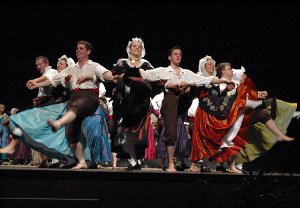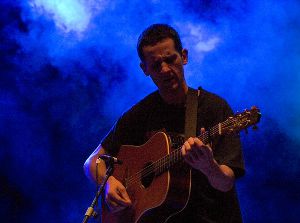
The pejorative connotation of the word folk goes far beyond the simple notion of an unchanged music. To explain, let's bring up the context: by definition, traditional music is passed from generation to generation, but folk music is learned out of context. This new meaning needs to be further explained: in the case of traditional music, the musician inherits a musical knowledge from his elders. In the case of folk music, the musician can out of context only invent a music learnt from a tool – a music sheet, a recording… – without knowing the necessary code to understand it. This code can be fully transmitted only from another musician of the related culture. In the one case, two people are involved: a teacher and a learner, in the other case, there is only one person: the learner alone.
The idea of inventing out of context is perfectly acceptable as soon as the musician fully assumes this responsibility. The recreation should be clearly mentioned and not pretend to belong to a musical tradition which is not. The appropriation of traditional tunes has created some of the most inventive and important styles in music history – Bàrtok and Stravinsky being two of the most well known composers in this category. The subject is wide enough to be the topic of a specific post that we will write soon. For now, let's come back to the dissociation between traditional and folk music.
The decontextualisation mentioned above brings up a few fundamental issues in all kinds of music. How to feel the difference between a kas a-barh, an an dro and a Breton tour learned from a music sheet? How to understand that we don't perform a piece by Bach, Mozart or Beethoven the same way, without bringing up the notion of style, and thus, of tradition? All of this is related to the teaching method. Also, the transmission from a teacher to a learner is absolutely not a guarantee to learn the "traditional" music style. By "traditional", we mean all kinds of music passed on by a tradition: classical, jazz, rock music… as well as the "traditional" music, commonly so named for lack of a better word.
One of the decontextualisation issues is quickly observable: in the past, without the opening of the media and internet, a society was quite closed to itself. Each member of this society was, somehow, a teacher, someone who had inherited and kept a common knowledge. The transmission happened from a number of teachers (the community as a whole) to a unique learner (a newborn, a newcomer in this community). In the modern society, the inversion of the process is a real challenge because the teacher is now more often alone in transmitting the code to a group of learners always more numerous in classes and workshops. The transmission of traditional music is really possible by confronting numerous sources, meaning teachers, because a single person will only teach a subjective part of his or her own understanding of the traditional matter.

One other main issue is that it's more common to enter the folk category rather than the traditional category (whether aware or unaware). Which musician never learned a tune one day only from the music notation, meaning out of context? How many musicians perform pieces from the Baroque time the same way they would perform classical or romantic tunes? If we all enter the "folk" category at some point in our life, the good news for those who are careful of the tradition, is that this can be cured quite easily. Just approach a traditional musician (according to the definition seen above) and relearn from him or her. Master classes, single lessons, workshops, sessions in pubs… the list of remedies is long enough.
More good news is, that the tradition is keen enough to integrate new things quickly. Irish dancing like in the Riverdance style reveals the phenomenon: in the mid-20th century nobody, even not in Ireland, would have qualified this kind of dance as traditional (nor Irish!) but since then, spread all over the world, it is now recognisable as "typically" Irish traditional dancing. Surprisingly enough, this form of dance is the result of the Irish cultural revival started at the end of the 19th century by the Gaelic League. This example shows a tradition well alive, regenerated with modern colours and strong in creativity. In the same way, the Breton fest noz, which is on Unesco's List of Intangible Cultural Heritage since 2012, was in fact invented, in its modern form, in the 1950s. In the same way, the Celtic harp is also an interesting case: almost forgotten in the middle of the 20th century, it is now on the list of traditional instruments taught in conservatoires. And last, how many tunes are considered as "traditional" by some musicians whereas their composers are well known by others?
The line between folk and traditional music is thin enough that one can cross it often without noticing it. Because our society is more and more open, it is difficult for musicians to appreciate the context of a tune and therefore to genuinely perceive this thin line. We shall conclude with the facts that, first, if folk music is a creative dead end, it has however developed the genre of musical appropriation and, second, the tradition keeps moving and assimilates new materials in order to answer the issues of the modern times.